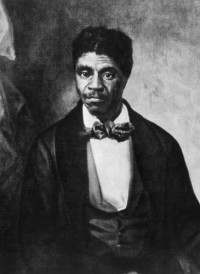Kansas brief cites Dred Scott decision in defending abortion law

Dred Scott.
Updated: A brief defending a Kansas abortion law cites the infamous Dred Scott decision to bolster its argument that the state constitution does not include a right to an abortion.
Slate and Above the Law have stories on the argument, advanced by Kansas Solicitor General Stephen McAllister in support of an abortion law that bans the most common method of ending pregnancy in the second trimester. The case is on appeal to the Kansas Supreme Court.
The Kansas Court of Appeals, ruling in January in an en banc decision, was equally divided on whether the Kansas Constitution independently protects the right of abortion. A federal district had found the abortion right was protected by the state constitution and issued an injunction staying enforcement of the law. The divided appellate decision had the effect of affirming the district court ruling
Section 1 of the Kansas Constitution’s Bill of Rights uses language from the Declaration of Independence. Section 1 states that “all men are possessed of equal and inalienable natural rights, among which are life, liberty, and the pursuit of happiness.” The U.S. Constitution’s 14th Amendment also uses language from the Declaration of Independence, but that doesn’t mean the state and federal documents both protect the right to abortion, the Kansas brief (PDF) argues.
The brief says courts across the country have recognized the Declaration of Independence is a statement of ideals, not law. Several citations follow, including one to Dred Scott, the U.S. Supreme Court case that found that blacks were not U.S. citizens and could not challenge slavery. The decision by Chief Justice Roger Taney describes the Declaration of Independence’s unalienable rights as merely “general words used in that memorable instrument” that have no legal effect, according to the brief.
That is what Dred Scott said, Above the Law says. “But I’ll let you in on a little secret: Justice Taney is the bad guy. Yeah. See, these quotes were expressly intended to justify the enslavement of human beings. If anything, this citation makes reasonable people think, ‘Hmmm … Maybe unalienable rights shouldn’t be mere puffery!’ ”
The brief says the Kansas provision was adopted before the 14th Amendment and could not have been intended to create rights co-extensive with the amendment. The brief also points to differences in the language of the 14th Amendment and the Kansas provision.
Update: Kansas Attorney General Derek Schmidt withdrew the brief on Wednesday and apologized for the citation.
“Neither the state nor its attorneys believe or were arguing that Dred Scott was correctly decided, and as soon as I became aware of it today, I ordered the state’s brief withdrawn,” he said. “The reference to that case was obviously inappropriate.”
Updated on Oct. 20 to report that the state attorney general apologized for the citation and withdrew the brief.



